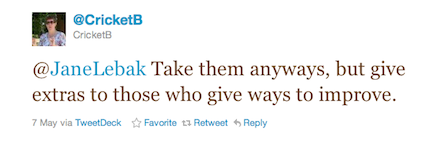A critique group has the upside of making you write something, anything. The crappy first draft won't write itself, after all. If you're a procrastinator or find time management a challenge, that regular meeting where you're supposed to show up with something can be excellent motivation. But I'm glad I didn't have a roundtable to chime in on each chapter on my first book as it was being written for this reason: It may have been too discouraging and I may have given up. After a few years in the query trenches, a few projects later, and after over a year on submission, I'm less likely to take a negative critique as a reason to quit.
Finding the right group presents a few issues. First, geography and time are critical. Retired folks who meet at 3 p.m. on Tuesdays won't work for someone with a full time job. Commuting across down during rush hour? Maybe not. And then there are the groups that have some version of the "know it all" who relentlessly assails passive voice and third person omniscient point of view because... well, because they heard it somewhere so it must be true. And frankly, sometimes a group member's writing is riddled with tropes or purple prose or stereotypes that it make it hard to take her critiques seriously. Having the self reflection to recognize our own weaknesses is hard enough but telling someone else their hard work is only mediocre is not a fun way to spend your spare time.
I was recently invited to join a critique group (geography and time worked, fortunately) and am cautiously optimistic that it won't kill my spirit or cause me to spin my wheels in endless re-writes that address every single comment. It has been eye opening to see how others view my characters (not likable? How dare you, sir!) and even more eye opening to read in other genres. And the camaraderie among writers makes me come away from each meeting feeling more determined to get through the next chapter and figure out that plot bunny. But at the end of the day, you have to analyze the input, make the changes that will improve your story, and learn to weed the rest out. You can't please everyone, and if there were ever a better example of the subjectivity of publishing, it will be the diametrically opposed viewpoints you sometimes hear from the group. But if your regular meeting leaves you feeling depressed, anxious, or talentless, then move on.
If the group meeting dynamic just isn't for you (writers are often introverts, right?) you may have better luck with a critique partner. Finding the right CP is like sighting a unicorn. But the nice thing is that your CP and you are tailor made because you choose each other based on what you write and what you are willing to critique. You set your own parameters about the kind of input you want: plot, consistency, voice, general impressions or a line by line commentary. You set the swap schedule and you're certain to be interested in their genre. QueryTracker and Twitter are only two of many web sites where CP marriages are made. I've had limited success finding a long term CP, but many people forge years-long and multi book CP relationships. It's more personal, and more flexible than a group.
Even if you're a die-hard loner, do consider beta readers, who will read your completed and hopefully edited book and give you feedback. Pick someone who will be honest with you and who reads in the genre you've written.
And whatever method you choose for getting feedback, don't ever let any one person's opinion deter you from continuing to write.

Kim English - is the author of the Coriander Jones series and the award winning picture book 'A Home for Kayla.' Her latest picture book, 'Rolly and Mac' will be released in 2017. Her website is Kim-English.com. She is represented by Gina Panettieri.




